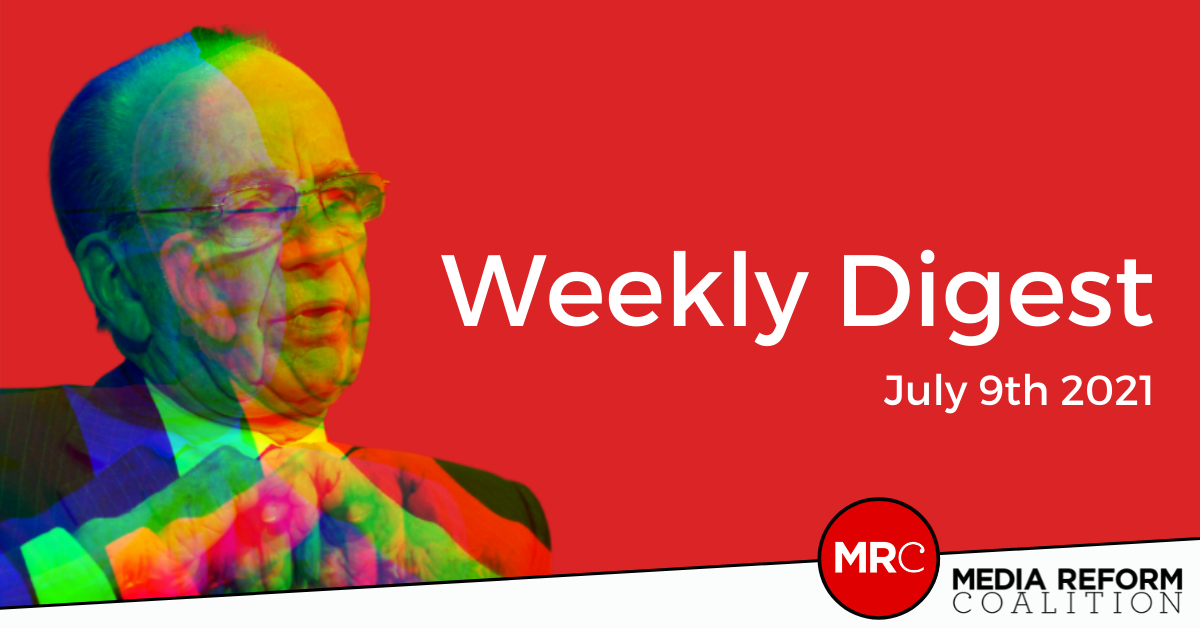Hi everyone, Eliz Mizon here with the Media Reform Coalition blog every Friday.
For even more media news and analysis, plus the latest campaigns, content, and UK media jobs, follow me at Chompsky: Power and Pop Culture.
For now, here’s your media news digest!
Channel 4 Privatisation: Government Consultation and the Not 4 Sale Campaign
After noting its desires to privatise the publicly-owned Channel 4, the government has launched a public consultation on the question that runs until September. Watch out for loaded questions… I’ll be interviewing public broadcasting expert Tom Mills soon at Chompsky – if you want more info you can read his write up on the C4 privatisation issue for Tribune, then Have Your Say on Channel 4 Privatisation. Trade magazine Broadcast has also launched the Not 4 Sale campaign – which you can sign up to.The BBC and Beyond campaign continues…
The recording of last week’s event on Reimagining Public service media in Wales, jointly organised with the Institute for Welsh Affairs, is now up online. Do give it a watch if you weren’t able to attend – it was a really constructive conversation about how a new fund for journalism in Wales could work, including how it can support innovative forms of journalism, whether membership models are replicable across different locations, and how to compare between media organisations serving very different kinds of communities. The final event in the Town Hall series will be on Can public media be antiracist? next Wednesday, July 14th at 6pm. We’ve got a really great lineup of speakers, so do tune into that on the MRC Twitter and Facebook or YouTube. Remember, you can contribute to our Manifesto for a People’s Media on the BBC and Beyond website here: https://bbcandbeyond.net/#manifestoThis Week’s Media News
- The G20 meets today to discuss a historic and potentially paradigm-shifting global tax floor agreement. The two-day summit will discuss bringing corporations’ tax floor to 15%, but Ireland – where many Big Tech companies, in particular, have their HQs due to its 12.5% rate – is “hunkering down to battle what amounts to a major threat to its livelihood.” (NYT)
- The Public Interest News Foundation has released its first Index of Independent News Publishing in the UK, a report mapping and analysing the independent and local news sector across the country. Its findings include detail about the finances, make-up, and reach of the sector. (PINF)
- The BBC’s annual report shows that the number of journalists earning over £150k per year has risen to 52, and salary spend in this bracket has risen by 3% since last year. However, the BBC’s salary spend for “top talent” overall has decreased by 10% and the company has shrunk its gender pay gap. (Press Gazette)
- Chinese “internet conglomerate” Tencent Games has been using facial recognition to enforce rules on how much time teenagers can spend playing. China has a “cyber curfew” and “underage players are required to log on using their real names and identification numbers as part of countrywide regulations aimed at limiting screen time and keeping internet addiction in check.” (NYT)
- News has emerged that Saudi Arabia is going to be funding a digital news platform based in Washington D.C., hiring U.S.-based media professionals, as it “begins a new lobbying effort aimed at the White House and Congress”. (CNBC)
- In yet another crackdown on freedom of the press, Belarusian authorities arrested a number of journalists from leading outlets and blocked the Nasha Niva outlet’s website. The journalists are detained on grounds of “posting unspecified unlawful information.” (AP)
- The Evening Standard has reported huge losses over the last year due to its commuter readership decreasing, as the coronavirus crisis kept many workers at home. The paper reported it is £17m down in the past 12 month period. (The Guardian)
- Naomi Osaka has written a cover story for TIME Magazine discussing her mental health and her relationship with the press, which she calls “amazing”: “I love the press; I do not love all press conferences.” (TIME)
- New national security laws in Hong Kong that are designed to curb doxxing have prompted backlash from an internet industry coalition. Authorities now have broader surveillance and censorship powers in the name of privacy, prompting major internet companies to “question the viability of continuing operations” there. (NYT)
- Marylin Manson has surrendered himself to police after fresh allegations of assault. (Deadline)
- Britney Spears’ mother Lynne has finally spoken out in support of her daughter, saying the court should respect her wishes and that she should be allowed to appoint her own lawyer. (BBC)
- The long-running and delightfully/abominably titled “Wagatha Christie” case, a libel case brought by Rebekah Vardy, hitting back at the accusation she leaked stories about Colleen Rooney to tabloids, continues. Vardy may be forced to turn over any communications she had with journalists as evidence. (The Guardian)



